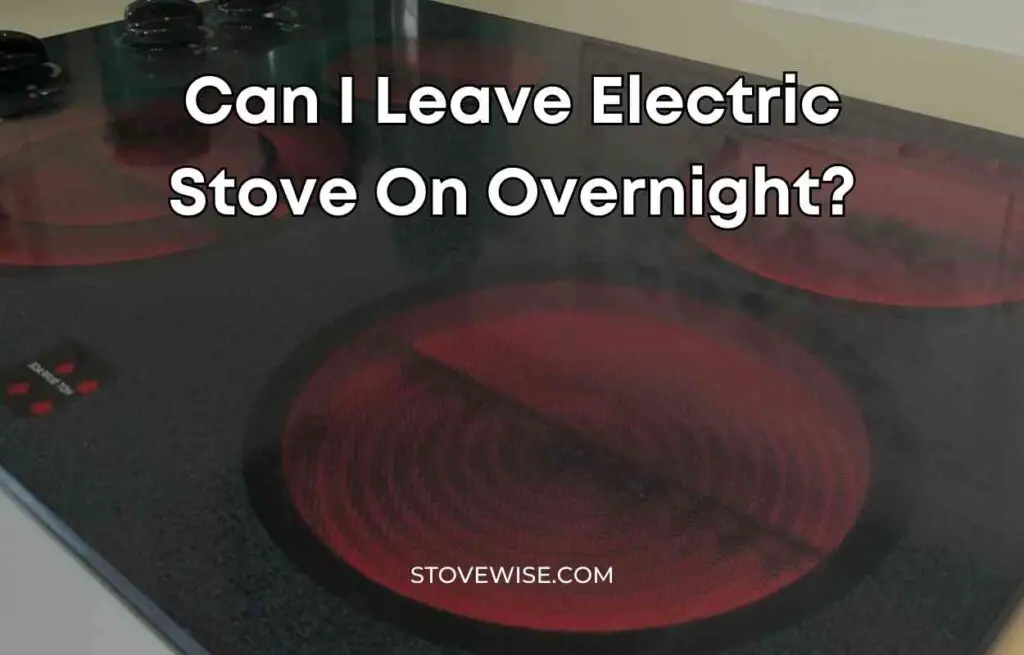Can I Leave Electric Stove On Overnight?
In this article, I’ll explore the safety concerns of leaving your electric stove on overnight and provide you with some tips to ensure your safety.
As a responsible homeowner, it’s natural to wonder if it’s safe to leave your electric stove on overnight. After all, you don’t want to wake up to a house fire or face a hefty electricity bill.
Can I leave electric stove on overnight? Leaving an electric stove on overnight is not recommended due to the associated risks. Fire hazards, electrical shock, and carbon monoxide poisoning are among the dangers. To mitigate these risks, it is best to unplug the stove from the outlet. Slow cookers or rice cookers are safer alternatives for extended cooking periods.

Contents
Can I Leave Electric Stove On Overnight?
Leaving an electric stove on overnight is not a safe practice due to the inherent risks involved. One of the primary concerns is the potential for a fire to ignite if the stove is left unattended for an extended period.
This risk becomes even more significant if there are flammable substances, such as cooking oil or grease, in close proximity to the stove. Even if the stove incorporates an automatic shut-off feature, it does not completely eliminate the possibility of a fire outbreak.
Another critical danger is the risk of electrical shock. Accidental contact with an electrical current from the stove can result in severe injuries or even loss of life. This risk becomes particularly alarming when the stove is left operating overnight without any supervision.
Furthermore, inadequate ventilation can lead to the accumulation of carbon monoxide, a poisonous gas. Insufficient airflow can cause this gas to build up in the surrounding atmosphere, posing a serious health hazard.
Exposure to carbon monoxide can trigger symptoms like headaches, dizziness, and nausea, and in severe cases, it can prove fatal.
To mitigate these risks, it is strongly advised to unplug the electric stove from its power source when leaving it on overnight. This simple precautionary measure effectively eliminates the potential for fire, electrical shock, and carbon monoxide poisoning.
Considering your concerns about leaving the stove unattended for an extended duration, it may be prudent to explore alternative cooking appliances such as slow cookers or rice cookers.
These devices are specifically designed for prolonged cooking periods and generally offer greater safety and lower fire hazards compared to an electric stove.
What If You Have a Gas Stove?
If you have a gas stove, the situation is a bit different. Gas stoves generate heat through a gas flame, which can also pose a fire hazard.
However, gas stoves are generally considered safer than electric stoves because they don’t require electricity to operate. If you have a gas stove, it’s still not recommended to leave it on overnight, but it’s less risky than leaving an electric stove on.
When Is It Safe to Leave Your Electric Stove On?
While it’s generally not safe to leave your electric stove on overnight, there are some exceptions.
If you’re slow cooking a stew or a roast, it’s safe to leave your stove on low heat overnight. However, you must take precautions to ensure your safety. Here are some tips to follow:
1. Use a Slow Cooker
If you’re planning to slow-cook your meal overnight, it’s best to use a slow cooker instead of your electric stove.
Slow cookers are designed to cook food at a low temperature for an extended period, making them safe to leave unattended. Additionally, slow cookers are energy-efficient, so you won’t have to worry about your electricity bill.
2. Use a Timer
If you must use your electric stove, make sure to use a timer. Set the timer to turn off the stove after a few hours, so you don’t have to worry about leaving it on overnight.
Most electric stoves have a timer function, so make sure to read your appliance manual to learn how to use it.
3. Keep Flammable Objects Away
If you’re using your electric stove overnight, make sure to keep flammable objects away from the stove.
This includes kitchen towels, curtains, wooden utensils, and anything else that can catch fire. Additionally, make sure to keep a fire extinguisher nearby in case of an emergency.
4. Check Your Smoke Detector
Before leaving your electric stove on overnight, make sure to check your smoke detector. If your smoke detector is not working correctly, it won’t alert you in case of a fire.
Test your smoke detector to ensure it’s functioning correctly and replace the batteries if necessary.
Alternatives to Electric Stove
If you’re concerned about leaving your electric stove on overnight, there are some alternatives to consider. Here are some options:
1. Slow Cooker
As mentioned earlier, slow cookers are a safe and energy-efficient alternative to leaving your electric stove on overnight. They’re designed to cook food at a low temperature for an extended period, making them perfect for slow-cooking meals.
2. Microwave
If you’re in a hurry and need to cook something quickly, consider using a microwave instead of your electric stove. Microwaves are energy-efficient and cook food quickly, making them an excellent alternative to stovetop cooking.
3. Toaster Oven
If you need to cook or reheat a small meal, consider using a toaster oven instead of your electric stove. Toaster ovens are energy-efficient and can cook or reheat food quickly.
Conclusion
In general, you shouldn’t leave your electric stove on overnight. It is a big fire risk and can make your electricity price go up. But if you have to use your electric stove overnight, be sure to take safety measures.
Use a slow cooker or a timer, keep flammable things away, and check your smoke alarm. You could also use a microwave or toaster oven as a safe and energy-efficient option for cooking on the stove.






